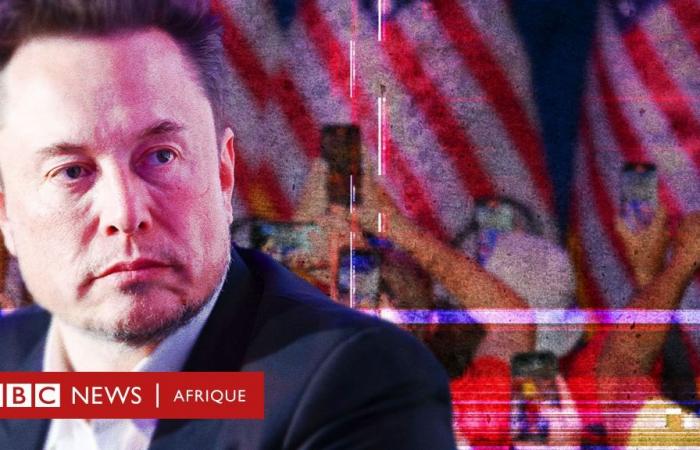Photo credit, Reuters
- Author, Global Disinformation Unit
- Role, BBC World Service
-
7 minutes ago
At a campaign rally in October, Donald Trump had a special message for tech billionaire Elon Musk, who stood beside him wearing a black “Make America Great Again” cap:
“He’s a great man,” Mr. Trump said as the evening light faded, “he saved free speech. »
The event was held on the grounds of an agricultural show in Pennsylvania, where, nearly three months earlier, a shooter attempted to assassinate Mr. Trump.
Minutes after the failed attack in July, Elon Musk officially endorsed Trump for president on X, the social media platform formerly known as Twitter that he owns, and actively campaigned for him.
This announcement marked another turning point in Elon Musk’s political evolution.
His statements about defending free speech help explain his transformation.
X-rated electric cars
Elon Musk’s ventures into electric cars, space travel and satellite internet for all made him famous and made him the world’s richest man, but his political views have been harder to pin down.
In 2011, he described himself as “moderate” and “rather socially liberal and fiscally conservative.”
Journalists who have closely followed his career say Musk’s views began to change during the Covid years and under the Biden administration.
Early in the pandemic, he questioned the severity of Covid-19 and was highly critical of lockdown restrictions, which he called “fascist” during a Tesla conference call in April 2020.
Around this time, one of his children was beginning a gender transition, something he later said he disapproved of.
He has complained about progressive values, including identity politics, and what he often calls the “woke mind virus.”
Photo credit, Reuters
He accused social media platforms like Twitter of having a left-wing bias.
In March 2022, a text message exchange between Mr Musk and his ex-wife showed the couple were outraged by Twitter’s suspension of a right-wing satirical site. She suggested buying the platform and making it “radically free of speech,” court documents revealed.
That year, the businessman purchased the company for $44 billion. It would later be renamed the X platform.
Freedom of expression
When asked why buying Twitter was so important to him, he cited the importance of free speech “for a healthy democracy” and the need for a “digital public square.”
In the name of his version of free speech, huge changes have been made, including huge staff reductions. He reinstated suspended accounts, such as those of conspiracy theorist Alex Jones and Donald Trump, which pleased some Republicans.
At a basic level, freedom of speech is the moral right to express ourselves and to hear what others have to say. It is often accompanied by protections, such as the criminalization of hate speech or incitement to violence. In the United States, freedom of speech is protected by the First Amendment to the Constitution.
It has taken on a political dimension, especially with regard to the Internet.
“Republicans have become very adept at using the fundamental rights enshrined in the Constitution as a kind of political football, saying, ‘We defend these rights and the Democrats oppose them,'” says professor Jeffrey Howard, an expert on the political philosophy at University College London.
There is concern about how social media companies moderate content and, on the right, a feeling that what is considered hate speech, harassment and bullying has been misconstrued, he says.
“I think it’s a legitimate argument to have. But this is not a debate between people who believe in freedom of expression and those who do not,” adds Professor Howard.
-Photo credit, EPA
Absolutist of freedom of expression?
Mr. Musk has shown how far he is willing to go to protect his version of free speech abroad too, leading to international rows.
When he refused to ban several accounts linked to disinformation and electoral violence in Brazil, he was hailed as a hero by supporters of far-right former President Jair Bolsonaro.
However, he was accused of hypocrisy by some after X accepted requests to remove content from governments, such as those of India and Turkey.
He often states that the platform cannot go beyond the laws of the country in which it operates.
So although in a post on
X does not allow all legal speech, and the platform has rules prohibiting certain types of harmful speech.
Elon Musk’s statements about protecting free speech have been called into question after high-profile journalists had their X accounts temporarily suspended in December 2022, in connection with coverage of an account following his jet private.
He is the most followed account (over 200 million) on X and since 2022 he has posted more than double the total number of his previous tweets, according to data analyzed with NodeXL, a social media monitoring tool from Social Media Research Foundation.
“His information feed is really X all day, every day. That’s where he gets his news,” says Kate Conger of the New York Times, who has interviewed people close to Mr. Musk and wrote a book about him.
With his huge following on X, Mr. Musk has amplified misinformation, such as an anti-Semitic conspiracy theory and unproven rumors about vaccines.
Photo credit, Reuters
Pro-Trump activism
Elon Musk had already publicly indicated that he no longer supported the Democratic Party when campaigning for the 2024 US presidential election began, and he officially endorsed Mr Trump in a post on X in July.
He went all in, says Kate Conger, and was posting virtually every few hours, often either in support of Donald Trump or attacking Kamala Harris.
Mr. Musk parroted Donald Trump’s false claims of election fraud and unproven accusations that Democrats imported voters, broadcasting this information to a wide audience.
One topic he returned to frequently was the idea of free speech.
“This is not an ordinary election. The other side wants to take away your freedom of speech,” Mr. Musk said at the Trump rally, a month before Americans went to the polls.
The political calculation paid off. Mr. Musk has been tapped for a White House advisory role on regulations and spending and, for the moment, appears very close to President-elect Donald Trump.
Throughout his career, Elon Musk’s companies have received billions of dollars in government contracts and there are now concerns about a possible conflict of interest.
It may not always have been the original plan, but what was presented as a project to protect free speech led to the transformation of a social media platform.
His supporters say he “saved” free speech. Others, like Professor Howard, might disagree:
“My personal inclination is that X is not as healthy a place for open public discourse as it was in the pre-Musk era. »
Elon Musk did not respond to our request for comment.






